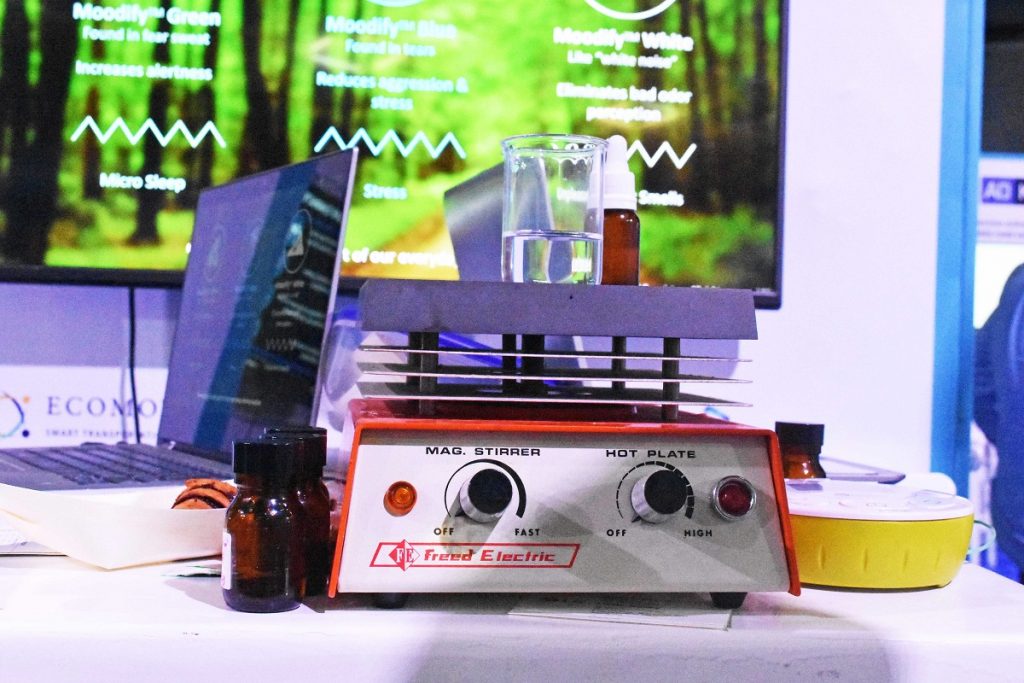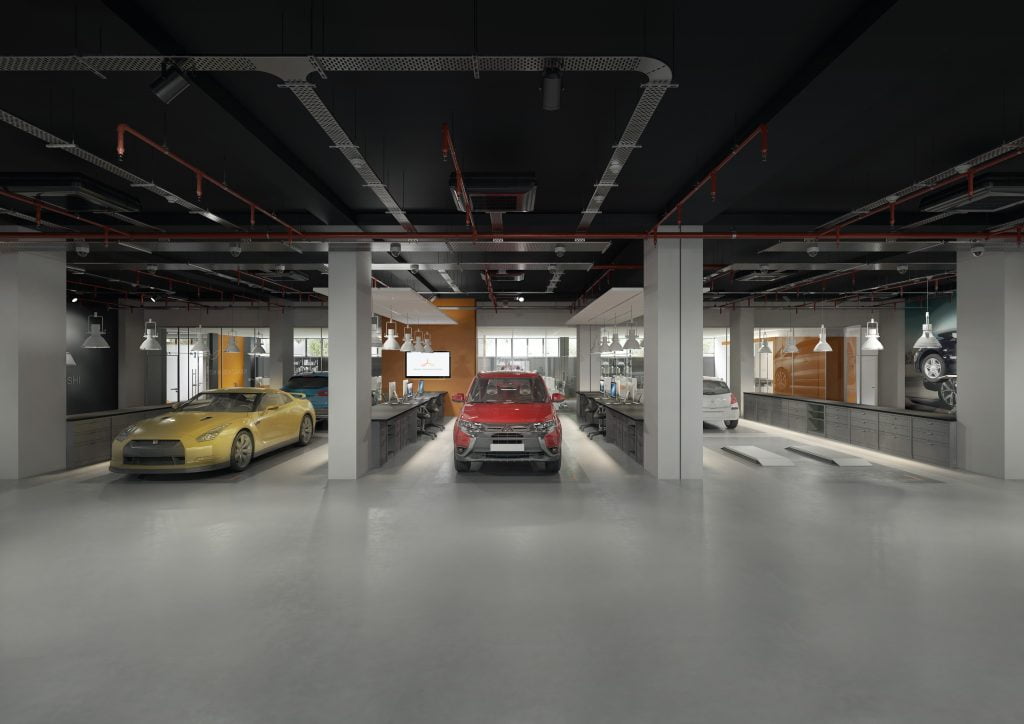Most of the time, it starts completely innocently. You finally brought a banana to work, but forgot it in the car on a sunny day. Or, you took a drive with an untrained puppy and it decided your car seats remarkably resemble grass. Maybe your friend borrowed your car and in it smoked her “last” cigarette.
Regardless, the smell never came out. You tried a multitude of air fresheners and cleaning products, each one bringing its very own sickly sweet smell to the car’s already malodorous interior.
A possible solution
Israeli startup Moodify promises to solve odor issues with their functional fragrances that do not cover up awful smells but instead change your perception of them.
Dr. Yaniv Mama, a psychologist and mathematician, and Yigal Sharon, a psychotherapist, founded Moodify together in 2017 based on the idea of artificial empathy. Sharon, who serves as Moodify’s CEO, explains to NoCamels: “Artificial empathy is all about computers being able to know how you feel and basically reflect it to you in real-time. And help you feel better.”
Moodify began with the intent to create “Empathetic Car” systems that, in theory, would use video cameras and physical monitors to analyze a driver’s body metrics, such as heart rate or body language, and then react accordingly to improve performance and enhance safety. For example, the car could potentially recognize a driver’s fatigue and consequently provoke alertness by emitting a certain smell.
So, let’s talk active scents
Over the past month, Moodify has pivoted to focus first on intervention technologies beginning with olfactory communication through “active scents,” Sharon explains.
“Scents are interesting for us because they are immediate and they are effective,” he says.

Moodify’s first product, expected to be released in January 2020, is a “white scent for mobility,” according to a company powerpoint slide at the EcoMotion 2019 event last month. Moodify ™ White is “like white noise” and “eliminates bad odor perception” by being personalized to target specific smells, like rotten bananas or cigarettes, and block a consumer’s ability to recognize that odor.
This device will circumvent the problem of smells trapped in a vehicle by dealing with the problem through the consumer’s perception of the issue.
Moodify expects this product’s first clients to be automotive-related companies such as rental car agencies, service car businesses like Uber or Lyft, and used-car sellers. The product will be a small computer device that will emit odors to “influence the perception of smell so that a human being will not be able to smell bad stuff, like a bad odor,” according to Sharon.
The product will work for one to six months, depending on the size of the car, its type, and the abrasiveness of the smells, according to Moodify.
The formula for this “very, very advanced perfume,” to use Sharon’s words, comes from a decade worth of research at the Neurobiology lab in the Weizmann Institute of Science.
Moodify has an exclusive licensing agreement with the lab to commercialize its olfactory research and manufacture, market, and mass produce “active scent” products.
Synthesizing chemosignals
Sign up for our free weekly newsletter
SubscribeUsing the institute’s research, Moodify plans to later expand its olfactory product line to produce a Moodify ™ Green and Moodify ™ Blue. These active scents will emit synthesized pheromones to which humans have evolved to react in specific ways.
Dr. Meny Benady, Moodify’s board chairman explained these chemosignals to NoCamels at the EcoMotion event. “We humans transmit and communicate with other humans by smells. You may not be aware, but when we are afraid, our sweat has a pheromone which you can sense and it will make you alert. Because it’s a survival thing. If somebody in the tribe is attacked and he is afraid – he wants the rest of the tribe to be alert. So, there is a pheromone which increases alertness and arousal. It’s a chemosignal. It reacts directly with your brain. You cannot decide if you want to be alert or not.”
Another pheromone, he adds, “is a relaxing pheromone which is found in the tears or women and children. When women and children are attacked, they cry to reduce the aggression of their attacker.”
According to the company’s EcoMotion presentation, Moodify ™ Blue utilizes a “relaxing pheromone synthesized from molecules” in tears shed by women. It acts on the parasympathetic nervous system, and calms down the heartbeat.” This product can be used to calm down a stressed driver, he explains.

Further, Moodify ™ Green was found in the “fear sweat” of parachuters and will be used to increase alertness to combat “microsleep” at the wheel.
According to moodify, the synthesized chemosignals will be emitted in cars in two main ways: 1. Either the car will “empathize” with the driver, analyzing driving patterns or body language to determine whether the scent is needed; or 2. a driver could press a button to use the active scent on demand.
Moodify says it is currently working with integrator, Tier 1 companies to implement their active scents into existing car technologies.
Earlier this year, Moodify was selected among a handful of startups to participate in Tel Aviv’s CityZone project, a mini-city-within-the-city at the Atidim High-Tech Park where advanced technological solutions for smart city ventures are vetted and tested. The project is run in partnership between Atidim, the Tel Aviv Municipality, and Tel Aviv University.
SEE ALSO: Mini-City Inside Tel Aviv Tests Advanced Tech For ‘Cities Of The Future’
The work with CityZone in part helps the company network and interact with both big and small automotive companies to come up with innovative intervention solutions. The startup has an office at CityZone and has been working there for over two months.
Moodify is also among a dozen Israeli startups taking part in the newly established innovation lab in Tel Aviv by the Renault-Nissan-Mitsubishi Alliance, a world-leading Franco-Japanese strategic partnership of auto giants.

Finally, Moodify says it is also working on a product similar to Moodify ™ White for hotel rooms and plans to launch it about six months after the car device.
Benady explains the demand: “20 percent of hotel rooms have bad smells. Now, if you are the Hilton, every five years they just replace everything. You know all the paddings and carpets. But, if you are a medium hotel, you can’t afford to do that. And to get rid of the smell, the only way is to strip everything.”
The active smelling device could isolate different malodors, as well as promote brand smells. But it’s exact design or which specific hotel brands will be using it is still unclear.
Many of Moodify’s products are still in the development stages, leaving NoCamels with several technical questions, but also imaginative dreams of a future void of rotten-banana-smelling cars.
Related posts

Editors’ & Readers’ Choice: 10 Favorite NoCamels Articles

Forward Facing: What Does The Future Hold For Israeli High-Tech?

Impact Innovation: Israeli Startups That Could Shape Our Future




Facebook comments